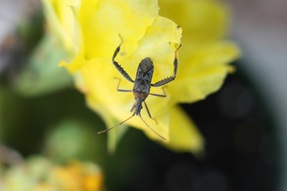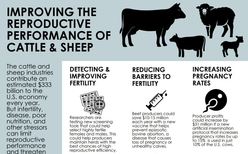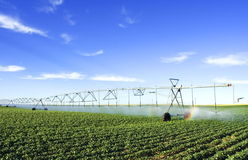|
Having trouble viewing this email? View it as a Web page.

|
|
|
Fresh from the Field is a weekly album showcasing transformative impacts made by grantees supported by the National Institute of Food and Agriculture.
August 24, 2017
|
|
Success Stories
 Little shrub could make big impact to the tire industry
Cooper Tire & Rubber Company and its consortium partners, Cornell University, Clemson University, and USDA’s Agricultural Research Service produced
several sets of concept passenger car tires in which all the natural and
synthetic rubber is replaced by guayule natural rubber. Guayule is a shrub
grown primarily in the Southwestern United States. According to Chuck Yurkovitch, Cooper's Senior Vice President, “The
results of this grant have been groundbreaking. Never before
has it been proven that guayule is a viable source of domestically produced
natural rubber for the tire industry. However, through the combined effort of
industry, government and academia, the Biomass Research and Development Initiative (BRDI) team has unequivocally demonstrated
just that.”
NIFA supported the research through the BRDI program.
Read about guayule tires. Image provided by Cooper Tire.
|
News Coverage
 New diets may affect animal reproduction
Scientists know that when wildlife feed on invasive species, they
can get sick. Until now, no one had studied how invasive species affect reproduction
according Christine Miller, a University of Florida associate professor
of entomology.
“Tens of thousands of species of animals are feeding on new foods
because of what we as humans have done. We’ve moved species around, mixing and
jumbling it all up,” Miller said. “This study specifically looked at what that
would mean for traits that are important for reproduction. The next step is to
see how it affects reproduction itself.”
Researchers saw cactus bugs lose some of their masculine traits
after only a slight change in their diets. “This
work suggests that when animals eat foods they are not accustomed to eating,
the differences between the sexes may be reduced or disappear,” Miller said.
“In other words, it seems that new, stressful environments can create
androgyny, which may reduce reproduction.”
NIFA supports this research through Hatch funding.
Read the UF cactus bug story. Image provided by Christine Miller/UF.
|
The Library
 Study: multiple sclerosis and the flu
For most people, a case of
the flu causes several days of discomfort, then they recover. For those with
multiple sclerosis (MS) or other neurological diseases, the flu may trigger a
cascade of immune responses that can result in relapse. Researchers from the University
of Illinois (U of I) shed light on what may be happening in the brains
of MS patients during upper respiratory infections.
According to Andrew
Steelman of U of I, “We know that when MS patients get upper
respiratory infections, they’re at risk for relapse, but how that happens is
not completely understood. A huge question is what causes relapse, and why
immune cells all of a sudden want to go to the brain. MS patients have one
or two relapses a year; it’s thought that these relapses contribute to the
progression of the disease."
NIFA supports this research through Hatch funding.
Learn about the promising MS research at U of I.
Image provided by Lauren D. Quinn.
|
 Chew on this: ruminant research makes for healthier cows and sheep
The cattle and sheep industries contribute an estimated $333
billion to the U.S. economy every year. Researchers at the University of
Alaska and other land-grant institutions are investigating the factors that
improve fertility among these ruminants.
Collective research to date could lead to substantial savings for
producers. One project developed a
vaccine to prevent a disease
that causes loss of pregnancy or unhealthy calves. This vaccine could save could save beef producers $10-15 million a year.
NIFA provides support with
Multistate Research Funds (MRF).
Read the impacts of the MRF livestock reproduction.
|
Video
 Decision tools to help farm businesses
How does a farmer decide
what size tractor to buy? Or how to calculate break-even selling prices for
crops? Iowa farmers have a one-stop shop to help them make business decisions with Iowa State University Extension. The Ag Decision
Maker’s website offers fact sheets, spreadsheets, publications, and other
resources that provide guidance on how to make informed decisions on the farm. The site receives nearly 10,000 visits daily.
Watch the ISU
Extension Ag Decision Maker video.
|
Tweet of the Week
#NIFAIMPACTS
|
|

NIFA’s mission is
to invest in and advance agricultural research, education, and extension that
solve societal challenges. NIFA’s investments in transformative science
directly support the long-term prosperity and global preeminence of U.S.
agriculture. To learn more about NIFA’s impact
on agricultural sciences,
visit www.nifa.usda.gov/Impacts, sign up for email updates or follow us on Twitter @USDA_NIFA, #NIFAImpacts.
###
USDA is an equal opportunity lender, provider, and
employer.
Editor: Falita Liles
|
|